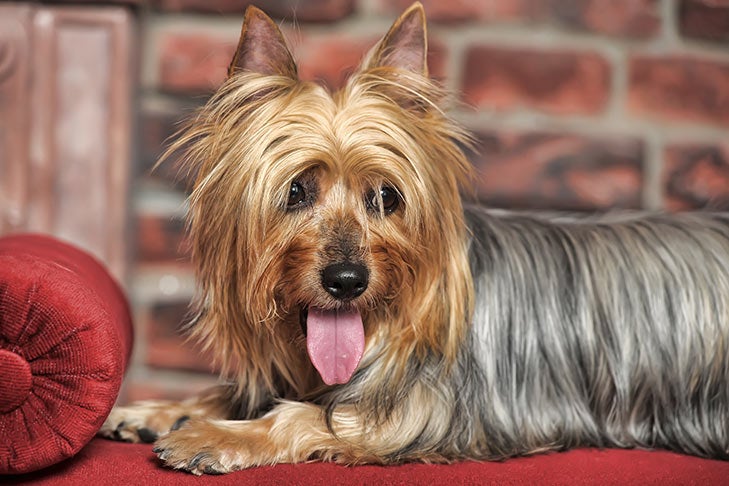
We know that dogs like to lick things, and it doesn’t stop at peanut butter treats. Sometimes, they’ll also lick soft things in the house like the carpet or the sofa — but why do they do this? If you notice that your dog is frequently and persistently licking the furniture, there may be more worrisome reasons.
Licking is a normal thing that dogs do to self-groom, to savor something delicious, and to show humans affection because dogs like the taste of our salty skin. But if your dog is constantly licking the sofa, your favorite chair, the bed pillows, and other surfaces, it’s probably not because the sofa is slathered with peanut butter. Licking furniture can signal a dog’s anxiety or stress or even a medical condition.
Dogs Licking Furniture Because They’re Bored
Dogs may lick furniture because they’re bored. Lacking any other stimulation to engage their mind and body, they could just be trying to pass the time. If the behavior isn’t constant and if your dog can be easily distracted from it, try to make sure they have toys, games, and treats to occupy themselves with when you’re not around.
Dogs Licking Furniture Because of Stress
Anxiety and stress can also result in obsessive licking and can be brought on by many different factors. Things like a change in your dog’s environment or routine, for example, can cause them to look for ways to release stress that they haven’t done before.
Dogs are creatures of habit and changes in their routine can make your dog anxious. Repetitive licking releases endorphins and is a way for dogs to self-soothe. In many cases, licking the sofa is an occasional response to occasional stress, loneliness, or boredom. However, it can become a habit if not checked.
Try adding more exercise, stimulation, and socialization to your dog’s life. You can do all sorts of things to enrich your dogs life, including playing more, taking up new activities like dog sports, arranging play dates, or getting them challenging, mentally-stimulating dog puzzle toys.
Exercise and activity are known stress relievers and, by the way, that works with humans, too. It’s the simplest remedy and there’s really no downside. Even if it doesn’t completely solve the problem, exercise will help your dog’s overall health.
Licking and Obsessive Compulsive Disorder
In some dogs, excessive furniture licking is genuinely a symptom of canine obsessive-compulsive disorder (OCD). If your dog can’t be distracted from licking, licks with intensity or aggression, or seems almost spaced out, that can be obsessive and/or compulsive behavior. In humans, it’s the difference between biting your nails when you’re anxious or not being able to leave the house without checking seven times that the door is locked.

No particular breed is more or less susceptible to canine OCD, but some dogs may be more prone to compulsive behaviors than others. One sees this in dogs that experienced severely restricted, sterile environments, like being chained in a yard or caged without exercise or socialization. These dogs may exhibit a stereotypy, defined as a singular, specific, nonfunctional behavior that they repeat constantly, in this case licking furniture. Even moving to a caring, stimulus-rich environment may not change the behavior, because stereotypies can become ingrained behavior that’s difficult to break.
But dogs brought up in a consistent, loving, and healthy environment can also have obsessive-compulsive disorder. Distraction and stimulation may not work in this case. Talk to your veterinarian about possible treatments, like anti-anxiety medication and behavior modification therapy. Over time, you’ll also learn to distinguish triggers and anticipate the behavior.
Licking Furniture Because of Health Issues
Excessive furniture licking can also be caused by physical, health issues. Dogs have sensitive digestive systems, and if they eat something they aren’t used to eating, it could throw off the bacteria in their intestines. Excessive licking, potentially of soft things like furniture or rugs, may indicate that your dog is nauseated or has an upset stomach.
Older dogs may also start licking furniture, for other reasons. If dogs begin to develop canine cognitive dysfunction, also known as dog dementia, this can bring on compulsive licking.
Figuring Out Why Your Dog is Licking Furniture
If you can figure out what’s causing the behavior you have a good chance of stopping it. At least in the beginning, even redirecting it can be helpful for your dog — and your furniture.
If you think that they are licking out of boredom, offer an alternative stimulation, like a dog toy or game. If you think it could be because of environmental stressors, take a moment to consider different things that may be affecting your dog in different ways than they affect you. This could be something as seemingly small as visitors or loud noises outside, to something bigger like moving or a new baby. Once you’re aware of what triggers could be causing the behavior, you may be able to either eliminate the cause or distract your dog with more appropriate stimulation
If neither of these seem to be the reason for excessive licking, consider medical issues, like gastrointestinal problems or dementia. If your dog has any prior conditions or is an older dog, examine how these could manifest in obsessive behaviors like licking.
Your best bet if you’re unsure is always to consult your veterinarian. Once they are able to rule out specific medical causes, they can offer treatment for anxiety or obsessive compulsive disorder, if applicable.
Remember that if your dog occasionally licks the sofa and can be distracted from it, that’s not necessarily abnormal behavior. After all, dogs will lick all sorts of things as a way to explore and experience their environment. It’s also a not uncommon way to handle anxiety. But when persistent licking causes slobbery sofa cushions or damp chair arms, it’s time to take steps. You’ll save your furniture from ruin and your pet from mental or physical discomfort.

